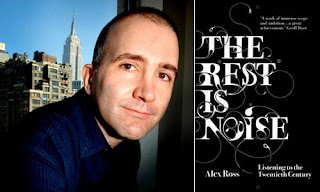Cultura: What's the best way to write about classical music?
Why is writing about classical music so difficult? I'm not talking about writing about the culture of classical music, its economics, sociology and politics - but about the music itself. How do you capture what Busoni described as "sonorous air"?
This was a subject discussed at the Association of British Orchestras' conference under the aegis of the Royal Philharmonic Society, which is running a campaign called Hear Here, aimed at focusing on the listening experience.
As a panellist I offered my experiences as classical music editor of the Guardian a few years back. I had felt that much writing about classical music (leaving aside criticism for the moment) was either mired in deadly jargonistic terminology seemingly designed to alienate; or was very much on the fluffy celebrity interview side of things. I had tried to find a different way - of finding great writers, who happened to have something to say about music. I had had mixed results, in fact, because so many excellent novelists, playwrights and essayists whom I knew to love classical music were afraid to tackle music - actually flinched from the idea. It was just too exposing, too difficult and writers said that they lacked the knowledge. Such writers might be perfectly happy to write about visual art.
One radical solution, I pointed out, was to give up the ghost and simply play our readers music instead of trying to describe it (our music website, especially for the purposes of pop, frequently points readers to YouTube for songs). I pointed out that Alex Ross's book The Rest is Noise is best enjoyed with the sound extracts he makes available (see his blog) but that he has said that the difficulty and expense of achieving rights and permissions had been almost defeating. But (I also said) writing about "sonorous air" is surely possible - look at Luca Turin and Tania Sanchez's brilliant book Perfumes: the Guide, which tackles an abstract subject, scent, with verve, vividness and wit. Surely the same can be done with music.
James Fenton, poet, critic, journalist and former Guardian columnist, said that there had been an assault on serious criticism, and that the rise of the feature interview had obscured the role of the expert. For serious writing on music, he said, turn to books. Radio 3 had often taken on the role of promoter rather than critic (excepting the Saturday morning programming that includes features such as Building a Library).
Claire Fox, director of the Institute of Ideas, gave a hilarious and provocative plea from a self-declared music ignoramus for classical musicians and orchestras not to undervalue themselves. "The musicial establishment has lost its nerve", she said. If she wished to learn about classical music, she would far rather do so from an expert (and she'd be willing to look up rebarbative technical terms) than be told things by someone essentially as ignorant as her. She also memorially described Tony Blair's arts policy as "Stalinism and water".
All good provoking stuff, but no problems really solved. Any ideas?
http://www.guardian.co.uk/culture/charlottehigginsblog/2009/feb/27/classical-music-opera
- Obtener enlace
- X
- Correo electrónico
- Otras aplicaciones


Comentarios